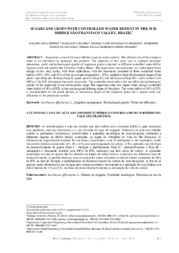Sugarcane crops with controlled water deficit in the Sub-Middle São Francisco Valley, Brazil.
Sugarcane crops with controlled water deficit in the Sub-Middle São Francisco Valley, Brazil.
Author(s): SIMOES, W. L.; CALGARO, M.; GUIMARÃES, M. J. M.; OLIVEIRA, A. R. de; PINHEIRO, M. P. M. A.
Summary: Sugarcane is one of the most affected crops by water scarcity. The efficient use of the irrigation water is an alternative to minimize this problem. The objective of this work was to evaluate biometric parameters, yield, and technological quality of sugarcane plants subjected to different controlled water deficit regimes in the sub-middle São Francisco Valley, Brazil. The experiment was conducted in a randomized block design, in two crop cycles, with three replications, with ten treatments consisted of three controlled water deficits (15%, 30%, and 45% of the crop evapotranspiration - ETc), applied at three development stages of the plant?sprouting and tillering (Stage I), grand growth (Stage II), and maturation (Stage III)?and a control with 100% of the ETc throughout the entire crop cycle. The controlled water deficit did not affect the technological quality of the sugarcane in any development stage. The sugarcane yield was higher when using a controlled water deficit of 30% of ETc in the sprouting and tillering stages of the plants. The water deficit of 15% of ETc is recommended for the grand growth, or maturation stages of the sugarcane plants for a greater water use efficiency of the production system.
Publication year: 2018
Types of publication: Journal article
Unit: Embrapa Semi-arid Region
Observation
Some of Embrapa's publications are published as ePub files. To read them, use or download one of the following free software options to your computer or mobile device. Android: Google Play Books; IOS: iBooks; Windows and Linux: Calibre.
Access other publications
Access the Agricultural Research Database (BDPA) to consult Embrapa's full library collection and records.
Visit Embrapa Bookstore to purchase books and other publications sold by Embrapa.

